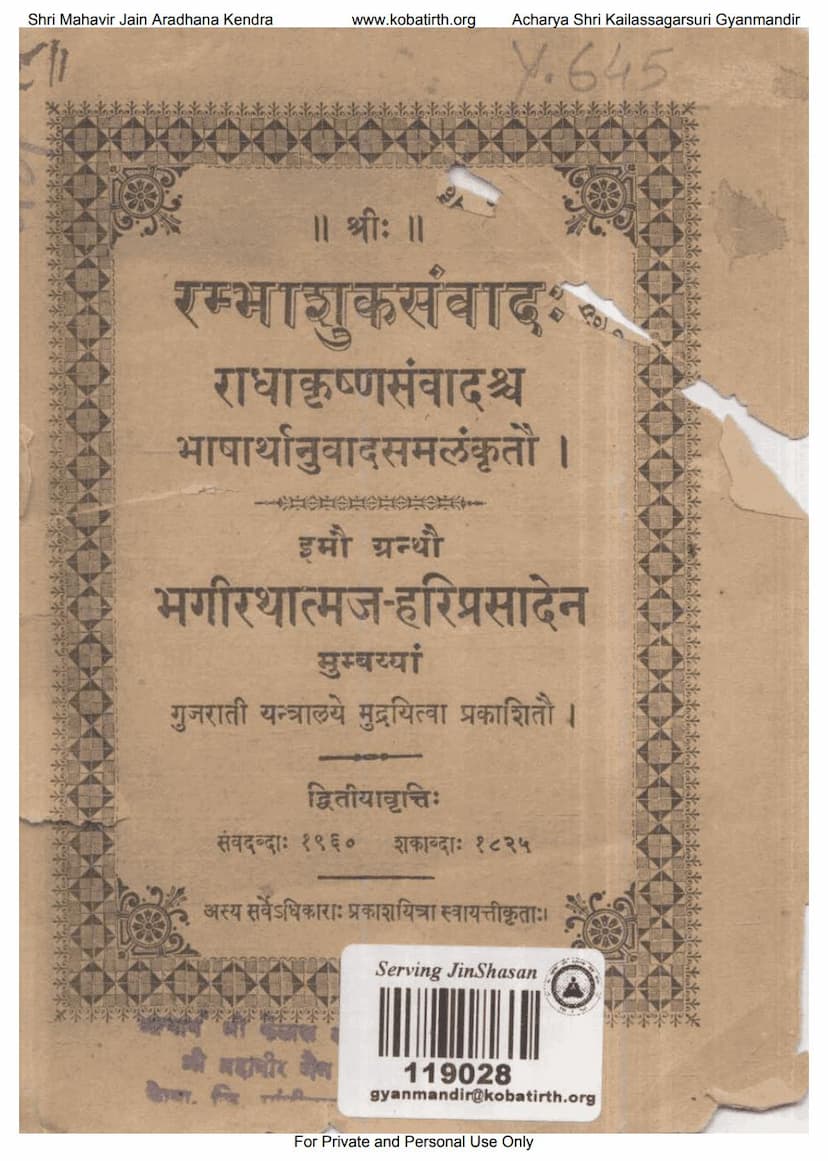Rambhashuk Samvad
Added to library: September 2, 2025

Summary
Here's a comprehensive summary of the Jain text "Rambhashuk Samvad," based on the provided pages:
Book Title: Rambhashuk Samvad (and Radha Krishna Samvad) Author(s): Hariprasad Bhagirath Publisher: Hariprasad Bhagirath Edition: Second Edition, published in Mumbai in 1960 (Vikram Samvat) / 1825 (Shaka Samvat).
Overview:
The book "Rambhashuk Samvad" is presented as a short yet profound text suitable for both those seeking knowledge and those who appreciate aesthetic sentiment. The introductory pages highlight that the text is a dialogue between Rambha, an Apsara (celestial nymph), and Shukadeva, a sage. The original text was in Sanskrit, and this edition features a Hindi translation and commentary by Pandit Vastiramji of Veri. The preface also mentions that the book includes "Radha Krishna Samvad," another engaging dialogue.
The "Rambhashuk Samvad" Narrative:
The core of the "Rambhashuk Samvad" is a debate or exchange between Rambha and Shukadeva.
-
The Premise: The story begins with Indra, the King of the Gods, feeling threatened by Shukadeva's immense penance. Fearing Shukadeva might usurp his kingdom through his spiritual power, Indra sends Rambha, the most beautiful and captivating Apsara, to distract and break Shukadeva's meditation.
-
Rambha's Approach: Rambha approaches Shukadeva while he is meditating by the banks of the Ganges. She attempts to allure him with her beauty and sensuous descriptions of the natural world, focusing on romantic and worldly pleasures. Her verses typically describe the beauty of nature, the sweetness of birdsong, the joy of romantic encounters, and the allure of desirable women.
- Key themes in Rambha's verses:
- The beauty of nature, including mango trees, cuckoo's songs, and the season of spring.
- The concept of love and its progression, from romantic attraction to physical intimacy.
- The desirability of beautiful, well-adorned, and sensuous women.
- The idea that a life without experiencing these worldly pleasures is wasted.
- Key themes in Rambha's verses:
-
Shukadeva's Response: Shukadeva, a detached and spiritually enlightened sage, consistently counters Rambha's worldly allurements with spiritual wisdom and the pursuit of higher truth. He redirects her focus from transient worldly pleasures to the eternal bliss of devotion to the Divine.
- Key themes in Shukadeva's verses:
- The importance of spiritual company (Sadhusanga).
- The glory of devotion to Lord Krishna (Krishnakirti).
- The attainment of true bliss through spiritual concentration and meditation on the Divine (Sachchidananda).
- The sanctity of holy places and the wisdom gained from spiritual discourse.
- The ultimate realization of the Divine through meditation.
- The futility of worldly pleasures compared to spiritual realization.
- He consistently emphasizes that a life not dedicated to realizing the Divine is indeed wasted.
- Key themes in Shukadeva's verses:
-
The Dialogue Structure: The dialogue proceeds in a question-and-answer format. Rambha presents a verse extolling worldly pleasures and beauty, and Shukadeva responds with a verse that contrasts this with spiritual pursuits and their ultimate rewards. This exchange continues for numerous verses, with each pair of verses highlighting the contrasting philosophies of materialistic indulgence versus spiritual detachment and devotion.
The "Radha Krishna Samvad":
Following the "Rambhashuk Samvad," the text includes a section titled "Radha Krishna Samvad." This section presents a dialogue between Radha and Lord Krishna. The format is similar, with Radha posing questions or making statements, and Krishna responding. The verses in this section explore themes of love, devotion, the nature of their relationship, and the divine essence of Krishna.
- Key themes in "Radha Krishna Samvad":
- Radha questions Krishna about his eternal youth.
- Krishna attributes his eternal nature to Radha's love and the nectar of her lips.
- Discussions about their divine relationship and how others perceive it.
- Radha's deep devotion and Krishna's affirmations of her importance.
- Themes of modesty, surrender, and the ultimate union of the soul with the Divine.
Overall Message and Significance:
The "Rambhashuk Samvad" aims to demonstrate the superiority of spiritual devotion and detachment over transient worldly pleasures. It argues that a life focused on sensory experiences and material comforts is ultimately meaningless compared to a life dedicated to seeking and realizing the Divine. The dialogue serves as an allegory for the internal struggle between worldly desires and spiritual aspirations. The inclusion of the "Radha Krishna Samvad" further emphasizes the path of devotional love as a means to spiritual liberation.
Publisher's Note:
The publication details indicate it is a significant work supported by the Shri Mahavir Jain Aradhana Kendra and Acharya Shri Kailassagarsuri Gyanmandir, highlighting its importance within the Jain tradition. The note also states that all rights are reserved by the publisher.